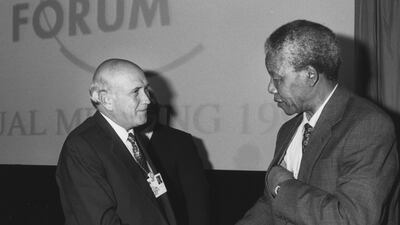There is a famous photograph taken at the World Economic Forum Annual Meeting in Davos thirty years ago.
It is of then South African president FW de Klerk and African National Congress leader Nelson Mandela. The two men, who would together dismantle apartheid in their country, are shaking hands in the grainy black-and-white image. A year later they would both win the Nobel Peace Prize.
Mandela gave a stirring speech at Davos in 1992. “Motivated by nothing other than the fact of our common humanity and informed by the realisation of the common destiny of the peoples of all continents, let us then do together what we can and must do together in the interests of all humanity, while each one of us also does what he or she must do in pursuit of their enlightened self-interest but recognising, in the end, that no man is an island,” he said.
Mandela was a leader bursting into the global consciousness, speaking of his determination to end apartheid and liberate his people “as a matter of urgency”. He also hoped to convince the international community to lift sanctions once an interim government was in place in South Africa. “We are as equally determined that this transformation should bring with it real changes in the material conditions of life of the people,” he said.
There have been other historic moments during an annual gathering of leaders and experts from the political and business worlds that has been held for more than 50 years in the snow-capped Swiss resort.

In 1994, then Israeli foreign Minister Shimon Peres and Yasser Arafat, then chairman of the Palestinian Liberation Organisation, spontaneously joined hands to thunderous applause. Together with former Israeli prime minister Yitzhak Rabin, they received the Nobel Peace Prize that year. The Davos Declaration signed in 1988 by Greece and Turkey helped both countries pull back from the brink of conflict. In 1989, Hans Modrow and Helmut Kohl, leaders on either side of the Berlin Wall, met to discuss German reunification. In that same iteration, North and South Korea held their first ministerial-level meetings.
I have covered the meeting since 2018, the year then US president Donald Trump was a swirling vortex of attention, with even chief executives of global companies following him around the Congress Centre like star-struck teenagers. In 2019, Greta Thunberg, the Swedish climate change activist, delivered the immortal words: “Our house is on fire."
“At Davos, people like to talk about success, but financial success has come with a price tag, and on the climate we have failed. And unless we recognise the failures of our system, there will be unspoken suffering,” she said.
Two years ago, the Covid-19 pandemic was in its infancy but growing quickly, with experts in Davos talking about how an outbreak in the Chinese city of Wuhan might spread farther. Much of the theory discussed that week in January 2020 proved to be remarkably accurate. At the time, we did not quite understand that we were living through history being made.
This year, the first in-person annual meeting since then will definitely not have the snow-covered streets we have become used to, held next week as a kind of springtime Davos, given the pandemic-related delays that have been navigated. It already has the flavour of a landmark event, though. This year’s theme even underlines this feeling: "History at a Turning Point: Government Policies and Business Strategies.”
The world is facing a number of challenges, including the war in Ukraine, rising inflation and energy crises. Economies are only now beginning to recover from Covid-19, and as a recent spike in cases in China shows, we cannot take this trajectory for granted. There is also the lingering question of how we regulate Big Tech companies and handle innovation in a measured, productive way. Job creation and access to economic opportunity is as urgent as it was before the coronavirus hit.
The climate emergency is, of course, the biggest task facing the world, including the opportunities and risks brought about by the energy transition to a low-carbon future.
All these forces can only be effectively met through co-operation – international and between the public and private sectors. Getting many of the key decision-makers in one location to work on solutions is thus more important than ever.
European leaders expected to attend in person include Spanish Prime Minister Pedro Sanchez, Polish Prime Minister Mateusz Morawiecki and German Chancellor Olaf Scholz, who is scheduled to speak on Thursday. European Central Bank President Christine Lagarde and International Energy Agency Executive Director Fatih Birol will be there. Ivory Coast Prime Minister Patrick Achi, Colombian President Ivan Duque, World Trade Organisation Director General Ngozi Okonjo-Iweala and Rwandan President Paul Kagame are set to attend as well.
From the Middle East, attendees include the Egyptian Minister of International Co-operation, Rania Al Mashat, Majid Al Futtaim chief executive Alain Bejjani and a number of senior officials from the Gulf. Nadia Murad, co-founder of the Global Survivors Fund and the 2018 Nobel Peace Prize Laureate, is also expected to be there.
It will also be an important “Ukrainian moment”, the Forum said, with President Volodymyr Zelenskyy due to speak virtually on Monday. Although a breakthrough for peace is unlikely, given that no Russian officials are invited to the meeting, Mr Zelenskyy has said it is an “especially important event” where post-war reconstruction will be discussed.
Ultimately, the defining moment of the meeting, perhaps, will be that it is happening at all. It could even mark a watershed for the return to the normality we crave after a disruptive couple of years.


